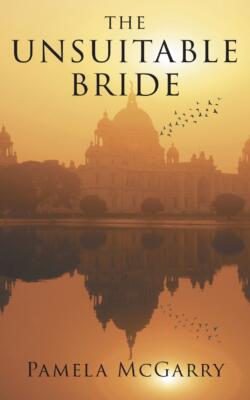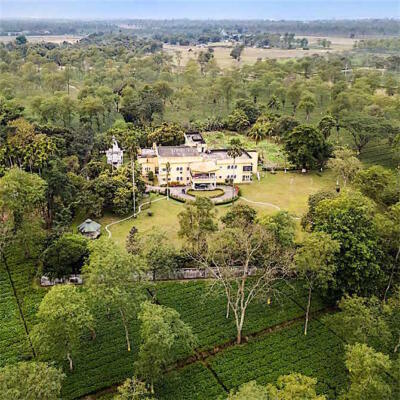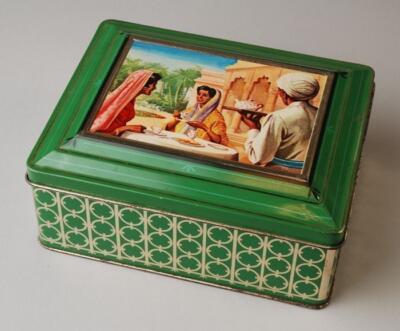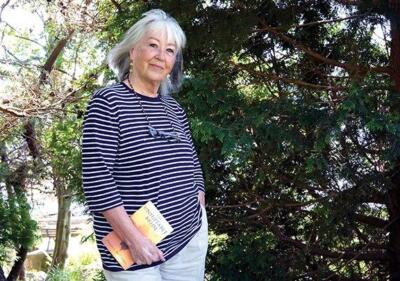1349 The very essence of India
The Unsuitable Bride
by Pamela McGarry
Gibsons: Well Hall Press, 2021
$20.00 / 9781777513405
Available on Amazon or, for $20 plus postage, by contacting mcgarrypamela@gmail.com
Reviewed by Valerie Green
*
 Pamela McGarry’s novel The Unsuitable Bride was not quite what I had expected.
Pamela McGarry’s novel The Unsuitable Bride was not quite what I had expected.

It tells the story of Nina Tolhurst, born in Calcutta to English parents during the reign of the British Raj, a state of government in India from 1858 until 1947. Her mother, Eveline Finch, died giving birth to her, and her father, Leonard Tolhurst (a high-ranking civil servant,) was a distant, somewhat cold man. She was raised by a servant, Karuna, who became the only mother she ever knew.
Nina’s early years were happy with Karuna but her story becomes tragic after her beloved Karuna leaves their house under a cloud. Later her father decides to send Nina to England to stay with his sister and gain an education “more appropriate for an English young lady.” Nina hates England and longs to return to her beloved India, which gave her the only happy years she ever knew.
Eventually she meets Deven Acharya, an Indian lawyer, in London and they soon fall in love and marry. Nina wants them to return to India after their son, Jushan, is born but Deven is reluctant to return. Finally he agrees to let her go on ahead with their son saying he will follow as soon as possible once he ties up matters in London.

In the book’s Prologue, Nina has just arrived at the Acharya tea estate in Assam — and that is where McGarry’s book takes on a whole new twist. On her first night in the Acharya home and still exhausted from travel, Nina dreams that someone is lying beside her in her bed and touching her body in a sexual way. She soon realizes it was not a dream. She begins to understand she will be living in a sexually dangerous environment and will be expected to lose all her independence as she is now owned by the family. Considered unsuitable in the eyes of the Acharyas, she is thought of as “the Indian Wife” who must accept all things — including betrayals and sexual rights that continue into the next generation.
It was hard for me, as the reader, to understand why Nina would so easily accept the sexual attentions of her father-in-law, Balram Acharya, the patriarch of the household. She had appeared to be a strong, opinionated young woman in her early years but suddenly she becomes submissive and accepting. Was it because she missed her husband as the days and months go by and still he does not join her in India? Did he know what would happen to her in his father’s house? And, if he did, why would he have allowed her to go there? Did he even care? These are questions the reader will ask. Deven eventually arrives but their marriage in the new India is not what Nina had expected.

Another thing that an editor might have flagged is that in Chapter 21 the author suddenly plunges her readers into the story of Justin Archer (formally known as Jushran Arachya), who is Nina and Devren’s son. This would have been better handled with his name at the head of the chapter so we know which voice is now talking.
As an adult, Jushran (Justin) is living in England and has fallen in love with Lizzie, another strong woman, who is carrying his child. They marry but after their baby dies, they return to India and once Lizzie is there she also accepts the same repulsive tradition of a father-in-law claiming ownership of his daughter-in-law sexually. These traditions and the acceptance of them seem hard to believe, especially into the next generation.
Many times during reading this book I wanted to scream at these women for not standing up for their rights and for allowing themselves to lose their independence and to be used in such a way.

But despite my criticism of the storyline, which I found unpleasant in places, Pamela McGarry’s prose is absolutely beautiful. She has captured the very essence of India — the sights, the sounds and the smells — and transports her readers to a land both exotic and hostile. It made me want to keep turning pages until the very end.
Although there is a great deal of acceptance of these somewhat incestualized relationships by both the men and the women in the Acharya family, I kept reading on, hoping perhaps that one of the family members would rebel and break the pattern and the traditions. Readers will also have to keep reading to find out for themselves whether this did actually happen. The Unsuitable Bride is well worth reading if only to discover another perspective on a culture that abused women in the name of tradition.
Pamela McGarry was born in London but grew up in Europe, the Far East and India. Her poems have appeared in many publications and she has also published a number of literary works, while travelling the world. She now resides on British Columbia’s Sunshine Coast.
*

Valerie Green was born and educated in England where she studied journalism and law. Her passion was always writing from the moment she first held a pen in her hand. After working at the world-famous Foyles Books on Charing Cross Road, London, followed by a brief stint with M15 and legal firms, she moved to Canada in 1968 where she married and raised a family, while embarking on a long career as a freelance writer, columnist, and author of over twenty non-fiction historical and true-crime books. She is currently working on her debut novel Providence, which will be published soon by Hancock House as the first of The McBride Chronicles, an historical four-generational family saga bringing early BC history alive. Now semi-retired (although writers never really retire!) she enjoys taking short road trips around BC with her husband, watching their two beloved grandsons grow up and, of course, writing. Editor’s note: Valerie Green has recently reviewed books by George Mercer, Adrian Raeside, Haley Healey, Grant Hayter-Menzies, Michael Whatling, Jen Sookfong Lee, and Kay Jordan.
*
The Ormsby Review. More Books. More Reviews. More Often.
Publisher and Editor: Richard Mackie
The Ormsby Review is a journal service for in-depth coverage of BC books and authors in all fields and genres. The Advisory Board consists of Jean Barman, Wade Davis, Robin Fisher, Cole Harris, Hugh Johnston, Kathy Mezei, Patricia Roy, Maria Tippett, and Graeme Wynn. Scholarly Patron: SFU Graduate Liberal Studies. Honorary Patron: Yosef Wosk. Provincial Government Patron since September 2018: Creative BC
“Only connect.” – E.M. Forster
8 comments on “1349 The very essence of India”
Author’s note. The implication that incest as described in The Unsuitable Bride is ‘traditional’ may be misleading. Traditional implies openness and pride and an interest in its perpetuation whereas ‘forbidden’ relationships such as incest/sexual abuse, though prevalent in India, are hidden and too often dismissed by the courts and ignored by the public thus enabling its continuance. For further info on the subject, here’s a link: > https://blog.ipleaders.in/incest-in-india/
As to the sexual-predation issue, I think we ignore a few things in the criticism of the portrayal of Nina: The enduring and complete power of family patriarchy in places like India, and what the world was like pre-#MeToo (and still is in many places and cultures).
I know sexual assault victims (I among them) who didn’t fully understand what had happened to them and didn’t view it as “assault” until the cultural shift that happened with Harvey Weinstein’s prosecution and conviction, and all the fallout since. It’s hard to fathom these days.
I was appalled at what happened to Nina, but bought into her reaction under the circumstances, as did the author, who (no surprise) knew someone it had happened to.
This review by Valerie Green is brilliant. From another woman’s pov, the sexual predation caught my attention as well as the acceptance of it in that family held in the arms of the patriarchial society. Nina was absolutely surrounded and gobbled up the minute she arrived. Somehow, this curiosity and wish that one of the women would stand up for herself in the face of this historical and cultural collusion created a tension that drives the reader forward in the book. I too, loved McGarry’s exquisite voice in the storytelling.
I think wanting to scream at the women in the book is a sure sign that the author has done what a good novel should – get us involved and opinionated! The question is: Do we believe Nina’s response to her situation? I’d say yes. Then it’s up to the reader to praise, sympathize or scream. And “unpleasant in places” describes many books which have since become classics. For me “The Unsuitable Bride” was pleasant, and very pleasant, in an awful lot of places.
I absolutely agree with Ms. Green that Pamela McGarry’s gifts as a writer and a storyteller are exceptional. However, unlike her, I had no problem understanding how Nina and Lizzie, marooned from all that was familiar and entrapped in a complicated, deeply patriarchal, culture of which they had no prior knowledge or experience, would feel helpless, confused, and unable to extricate themselves. As human beings, we are often strangers to ourselves, with aspects to our nature that are not readily discernible. Ms. McGarry’s willingness to explore that dark territory with wisdom and compassion is what makes her a great writer and “The Unsuitable Bride” a great novel.
Sounds like a story worth reading … to find out what makes the heroine tick. Judges at the Whistler Independent Book Prize must have been impressed because they recently picked “The Unsuitable Bride” as one of three 2021 finalists.